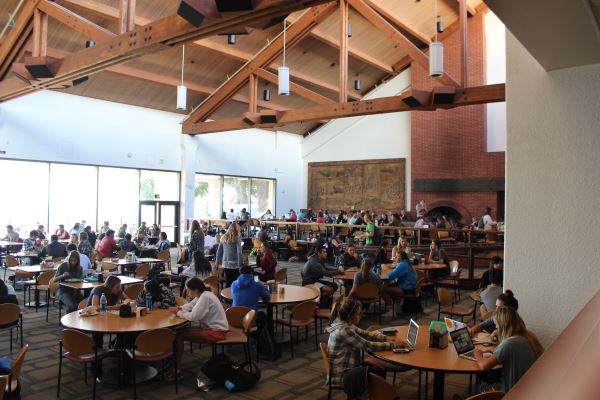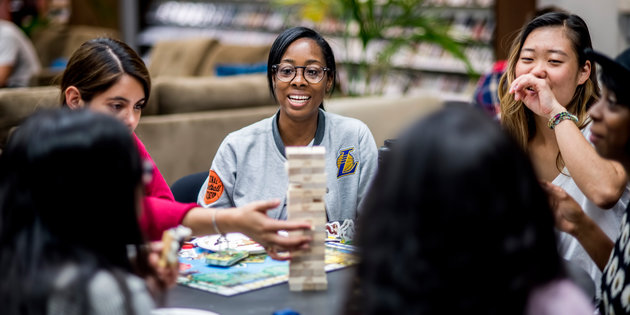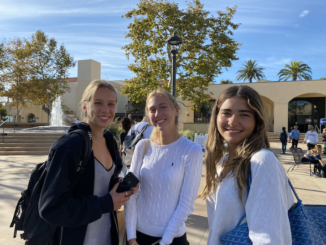
Who am I?
That is one of the dominant questions college students try to answer as they try to find their place among the masses.
One of the ways students form their identities is through the formation of cliques, or small social circles based upon shared characteristics of group members. The characteristics that unite groups of people are endless and can range as anything from cultural customs to religious affiliations to physical abilities.
“Cliques are highly visible on our campus,” said sophomore Spencer Ward, who is in charge of his fraternity Sigma Chi’s well-known philanthropy event, Derby Days. “There seems to be an inevitable and evident exclusivity associated with membership to the various social groups.”
Pepperdine’s cliques represent the diversity within the student body. Some consider the exclusivity within the different social groups to be a negative, while others find security and identity in their clique.
Two primary cliques at Pepperdine University are sororities and fraternities, and athletes. Other cliques include the debate team, Dance in Flight members, participants in specific majors such as media production or theater, NewsWaves crew members, various club members, and more.
To some extent, groups also form based on other more sensitive defining traits, including race and religion.
There is a high level of exclusivity involved within many of the groups that often goes undetected by insiders but is felt strongly by those who are not involved, students said.
Freshman cross-country runner and Alpha Tau Omega member Jordan Scandlyn said he feels a degree of security within his social groups.
“I believe going Greek is a valuable experience in the sense for an athlete to escape the drama in their own sport,” Scandlyn said. “I have found ATO to be a place to find my own identity with or without running.
“Greek life has been very supportive of my running career and encouraging beyond extent,” Scandlyn continued. “Especially being on a team that doesn’t draw many fans, it is nice to have a group of guys supporting me who are outside of my team.”
The support system cliques provide is one of the top reasons students said they join various social groups. The bond between group members particularly appealed to freshman Megan Duncan, who joined the Delta Delta Delta sorority.
“I joined Greek life because I loved the idea of a sisterhood,” Duncan said. “I constantly have a group of girls to hang out with and love as sisters. It’s really great being in a group of girls who love me for exactly who I am, and I love all of the crazy stuff we get to do together.”
Sophomore Triston Brown, who is also a runner and is a member of the Alpha Kappa Alpha sorority, sees these two forms of social groups as rather exclusive to outsiders.
“Cliques naturally form wherever you go,” Brown said. “At Pepperdine, unfortunately, the cliques are harder to permeate. It’s easier to find common ground and have conversations with those who are also involved in Greek life or athletics. Not many others are willing to step out of their comfort zones when they see exclusivity among cliques. I personally try to reach out to many different people from various groups to keep things interesting.”
Students outside of the main cliques at Pepperdine said they still find themselves able to maintain friendships with those involved in social groups.
“I rushed for Greek life at the beginning of the year,” freshman English major Alexa Garcia said. “I decided not to join because it was too expensive and a large time commitment. I don’t feel like the cliques are overwhelming, because I have friends from all different social groups. Sometimes I do feel the exclusivity when I am around multiple members of one specific group, though.”
Multiple faculty members have also observed the prevalence of cliques on the Pepperdine campus. They said these cliques are natural and not inherently bad.
Hannah Parmelee, director of Relationship IQ at the Boone Center for the Family at Pepperdine, has had the opportunity to observe the formations of cliques on campus, especially athletes and members of Greek life.
“They do not actively seek to exclude people,” Parmelee said. “They have simply developed a level of comfort with each other that others may have a hard time entering into without feeling like an outsider. This is all very normal and natural — we immerse ourselves in communities in which we feel known, accepted and belonging.”
Former athletic director and current Professor John Watson has had a great deal of interaction with the various cliques on campus over his years at Pepperdine.
“It is only natural that when people have similar commitments and interests they are drawn to one another,” Watson said. “At times any clique might be seen as unwelcoming to others because you are not part of a given program.”
As far as student-athletes go, additional circumstances draw the groups together even more so than other types of cliques.
“My experience is that most student-athletes spend a good deal of non-training time together for many reasons,” Watson said. “They know one another through training, competition and passion for a sport; they have similar schedules; they realize the limitations on free time to participate in other social aspects of the campus. Training ‘drills into them’ that they are a team and support one another in all aspects of life; they have mentors (coaches) that encourage them to support each other; and for many, their life before college was focused on associating with other athletes, so that is where they are most comfortable.”
Some students said they believe cliques at Pepperdine are based on socioeconomic foundations as opposed to other criteria, and that this detracts from their appeal.
“There are definitely a lot of cliques at Pepperdine,” freshman track athlete Epiphany Fitzpatrick said. “I think they are somehow based on wealth. Rich students tend to gravitate toward other rich students, and they don’t always pay attention to the people’s true characters.”
Other universities seem to have quite different social configurations from Pepperdine, according to their students. Cliques may exist, but they function very differently. The size of the Pepperdine student body seems to be one of the big contributing factors.
“Some people here act like there is a social ladder that doesn’t really exist,” Wake Forest University freshman business administration major Evan Mori said. “The majority of the school is in Greek life, so if there were clique divisions it would probably be the Greeks and athletes versus the rest of the student body.
“These aren’t standard cliques because each group thinks they are better than the other and are on the top of the social ladder,” Mori added. “However, most people don’t realize that in a college environment, there are too many people at the school to care.”
Wake Forest, like Pepperdine, is a private university and has a smaller population than typical state schools.
Brianna Thrailkill, a freshman elementary education major at Montana State University, had quite a different perspective on cliques in college.
“I don’t personally see any cliques at Montana State,” Thrailkill said. “Everyone gets along with each other. Greeks and non-Greeks mix with athletes and non-athletes, and nobody even thinks twice about it.
Cami Lowery, a freshman business major at Colorado Christian University — a private institution that is far smaller than Pepperdine — said there is not an issue with the formation of cliques there.
“There are no cliques at CCU,” Lowery said. “Due to our very strong community that is held together by our common love for Christ, we become one family that all support and motivate one another.”
Brynn Henderson completed this story in Dr. Christina Littlefield’s spring 2013 Jour 241 class.



